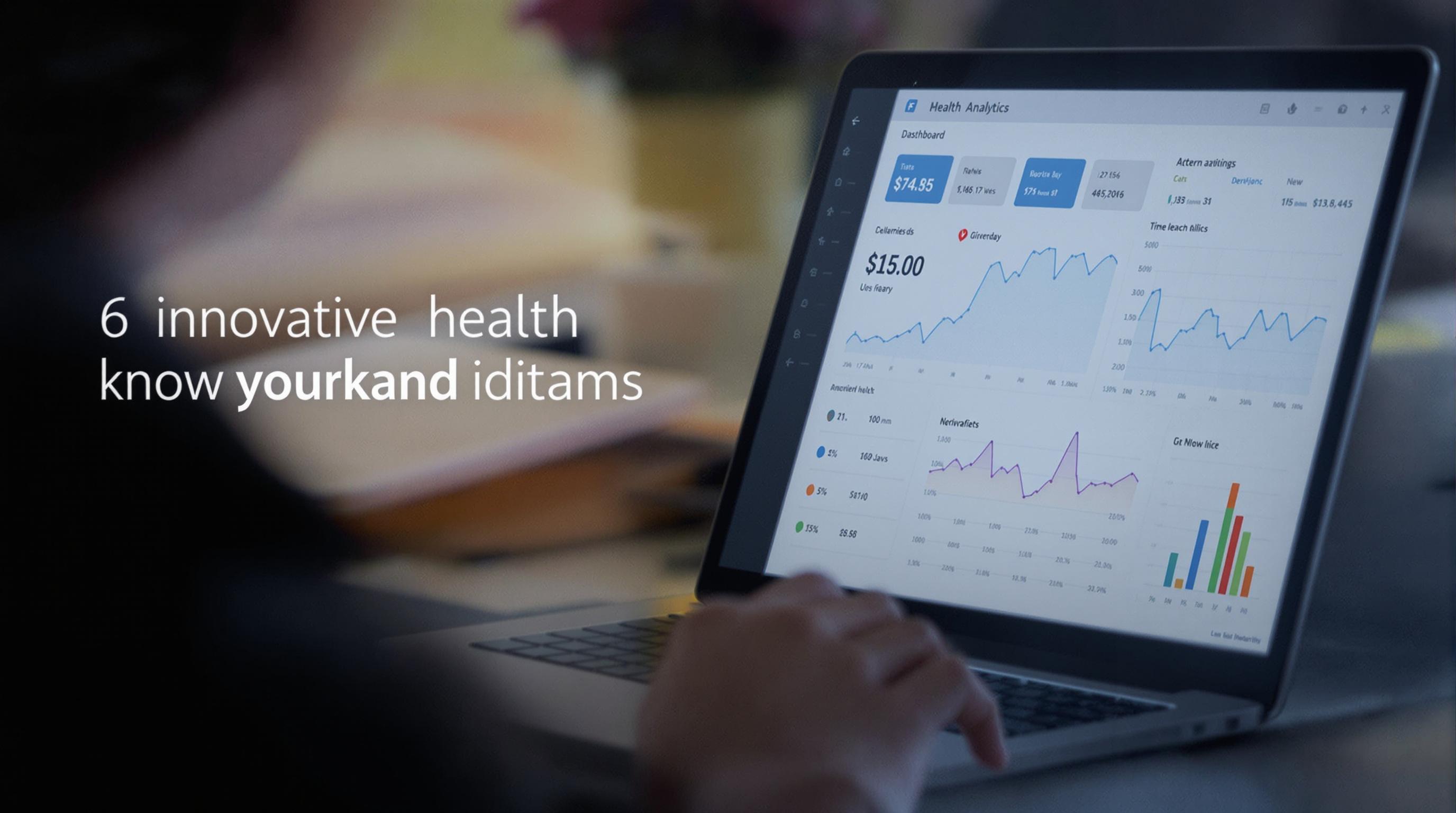Related Articles
- Top 6 Little-Known Medical Apps with User Interfaces That Actually Boost Patient Outcomes
- 5 Game-Changing Fitness Trackers from the Last 5 Years That Outperform Your Expectations
- Top 8 Breakthrough Portable Diagnostic Devices from the Past Five Years Revolutionizing Home Health Testing
- The Quiet Influence of Ancient Medical Records on Modern Healthcare Data Interpretation and Policy Making
- Top 6 Emerging Medical Coding Analytics Platforms from the Last Five Years for Data-Driven Decision Making
- Examining the Impact of Quantum Computing on Future Remote Healthcare Data Defense Strategies
Top 9 Advanced Wellness Intelligence Solutions Launched Since 2019 Driving Smarter Patient Outcomes
Top 9 Advanced Wellness Intelligence Solutions Launched Since 2019 Driving Smarter Patient Outcomes
Top 9 Advanced Wellness Intelligence Solutions Launched Since 2019 Driving Smarter Patient Outcomes
Introduction
As healthcare rapidly evolves, advanced wellness intelligence solutions have become paramount in enhancing patient outcomes. Since 2019, innovations leveraging artificial intelligence (AI), machine learning, and data analytics have transformed how wellness is monitored and managed. These technologies facilitate proactive care, personalized treatment plans, and improved patient engagement.
By integrating data from wearable devices, electronic health records (EHRs), and genomics, these solutions provide clinicians with actionable insights aimed at optimizing health outcomes. The shift towards smarter patient care is propelled by the need to reduce costs, minimize hospital readmissions, and empower patients to take charge of their wellbeing.
This article explores nine groundbreaking wellness intelligence solutions introduced since 2019. Each section highlights a unique technology or platform contributing to smarter, data-driven patient care and enhanced health management.
1. IBM Watson Health’s AI-Powered Wellness Analytics
IBM Watson Health expanded its AI-driven capabilities in 2019 by integrating wellness analytics into clinical workflows. The platform processes vast health data sets to identify risk factors and suggest preventive interventions. By analyzing lifestyle, biometrics, and medical histories, Watson Health can predict chronic disease onset and recommend personalized wellness plans.
Healthcare providers leverage this technology to monitor patient progress and adapt treatments proactively. IBM’s solution also supports population health management by identifying community-wide trends and health disparities, allowing targeted outreach initiatives.
Studies published in the Journal of Medical Internet Research recognize IBM Watson Health for contributing to reduced emergency visits and improved chronic disease control through data-driven wellness intelligence.
2. Google Health's AI for Early Disease Detection
Since 2019, Google Health has developed AI models that analyze medical images and patient data to detect early signs of diseases such as diabetic retinopathy and breast cancer. These algorithms enhance diagnostic accuracy and enable earlier interventions to mitigate disease progression.
Google's wellness intelligence tools also incorporate continuous health monitoring via integration with wearable devices, providing real-time alerts and health coaching to patients. This proactive approach supports sustained lifestyle changes and adherence to treatment protocols.
Peer-reviewed research in Nature Medicine has demonstrated the effectiveness of Google's AI in improving diagnostic sensitivity, making it a valuable tool in patient wellness management.
3. Apple Health’s Machine Learning-Enabled Care Coordination
Apple Health has significantly enhanced its HealthKit and ResearchKit platforms since 2019 by incorporating machine learning to foster care coordination. Its algorithms analyze aggregated health data to deliver personalized wellness insights directly to users and their healthcare teams.
By centralizing data from fitness trackers, sleep patterns, and clinical records, Apple Health promotes holistic management of chronic diseases such as hypertension and diabetes. Machine learning models identify behavior patterns that may undermine patient health and offer timely recommendations.
This integration encourages patient engagement and supports remote monitoring, reducing the need for frequent in-person visits. Apple Health’s transparency and privacy controls further empower patients to share relevant data confidently.
4. Philips HealthSuite Digital Platform
Philips launched its HealthSuite Digital Platform with advanced wellness intelligence modules in 2020. It aggregates data from connected devices and EHRs to provide clinicians with comprehensive health views. AI algorithms analyze this data to forecast patient risks and suggest tailored interventions.
HealthSuite supports chronic condition management, mental health monitoring, and post-discharge recovery by integrating predictive analytics and behavioral insights. The platform also drives patient adherence through personalized nudges and educational content.
Clinical trials published in Frontiers in Digital Health have shown HealthSuite's role in reducing hospital readmissions and improving patient satisfaction scores.
5. Cerner’s Wellness and Population Health Management Solutions
Cerner advanced its wellness intelligence offerings between 2019 and 2021 to support population health initiatives. Its platform uses AI to identify high-risk patients and stratify wellness interventions across cohorts. This targeted approach optimizes resource utilization and health equity.
The system integrates social determinants of health into its analytic models, enabling providers to address barriers beyond clinical care. It also facilitates remote monitoring and virtual wellness coaching through digital health tools.
Data in Health Affairs highlights Cerner's contributions to reducing health system costs while improving chronic disease management through its wellness intelligence technologies.
6. Fitbit Premium’s Personalized Wellness Insights
Fitbit Premium, relaunched with enhanced algorithms since 2019, offers users personalized health insights based on sleep, activity, heart rate variability, and stress metrics. The platform combines AI and behavioral science to motivate sustainable lifestyle changes.
By analyzing continuous biometric data, Fitbit Premium provides customized recommendations for improving fitness, nutrition, and mental health. The service also supports goal setting and tracks progress with adaptive feedback loops.
Research in JMIR mHealth and uHealth emphasizes Fitbit Premium’s effectiveness in increasing user engagement and contributing to better wellness outcomes over extended periods.
7. Siemens Healthineers AI-Driven Wellness Solutions
Since 2019, Siemens Healthineers has integrated AI-driven wellness intelligence into its diagnostic platforms. Their technology assists in early detection of cardiovascular and respiratory conditions by analyzing multimodal patient data.
The solutions emphasize predictive analytics and continuous monitoring to personalize patient management plans. They also facilitate remote patient assessments, reducing the burden on healthcare facilities while maintaining quality care.
Clinical results published in The Lancet Digital Health confirm improvements in early diagnosis and maintenance of wellness through Siemens’ AI applications.
8. Omada Health’s Digital Behavioral Therapy Platform
Omada Health has revolutionized wellness intelligence with its digital behavioral therapy platform launched post-2019. It combines AI with evidence-based coaching to address chronic conditions such as diabetes, hypertension, and obesity.
The program tracks patient behavior and biometric data via connected devices, delivering personalized coaching to instill healthier habits. Omada’s AI enhances predictive modeling to intervene before complications arise.
Peer-reviewed studies in Diabetes Care have validated Omada’s efficacy in improving patient adherence and reducing incidence of chronic disease complications.
9. Babylon Health’s AI-Enabled Virtual Care Platform
Babylon Health introduced its AI-powered virtual care platform in recent years to improve access and quality of wellness management. The system uses conversational AI to triage symptoms and guide patients to appropriate care pathways.
Babylon combines AI diagnostics with telemedicine consultations, enabling continuous wellness monitoring and personalized health advice. This approach minimizes unnecessary hospital visits and supports ongoing chronic condition management.
Evidence from BMJ Open shows Babylon’s platform contributes to efficient healthcare delivery and improved patient satisfaction through intelligent wellness interventions.
Conclusion
Advanced wellness intelligence solutions launched since 2019 represent significant progress in transforming patient care. By harnessing AI, machine learning, and integrated data platforms, these innovations enable personalized, proactive wellness management. This results in improved chronic disease control, reduced healthcare costs, and enhanced patient engagement.
Key players such as IBM Watson Health, Google Health, Apple Health, Philips, and others continue to refine their technologies, driving smarter patient outcomes worldwide. Continued collaboration between technology innovators, healthcare professionals, and patients will further unlock the potential of wellness intelligence.
As these transformative tools mature, the future of healthcare promises a deeper integration of digital intelligence with human-centered care, ushering in an era of smarter, more effective wellness solutions.




